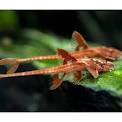Red Lizard Whiptail(40-50mm)
Red Lizard Whiptail(40-50mm)
check_circle Fast Shipping
check_circle Quality Products
check_circle Affordable Price
Reach out to us on ''available to order'' items via WhatsAp or email
20 in stock
Couldn't load pickup availability

Red Lizard Whiptail(40-50mm)
package_2
Product Description
Product Description
All our fish, shrimp and corals are bagged with fresh oxygen as well as a heat pack in winter.
When ordering livestock please select the box size and add it to your cart for accurate overnight (1-2 days) shipping costs. A small box can take 1-2 bags and a medium box 6 bags. One bag fits max 10 small (1-3cm) fish or max 2 medium (3-5cm) fish or max 1 large (>5cm) fish.
ONE SPECIES PER BAG. Eg: One bag of 10 neon tetra
This incredibly peaceful suckermouth catfish is a very colorful, manageable, and rare fish that can make a wonderful addition to almost any community aquarium!
The Red Lizard Catfish (Rineloricaria sp.), also known as the Red Whiptail Catfish, is a member of the Loricariidae family of South American suckermouth catfishes. While many suckermouth catfish species have yet to be bred on any major scale in aquariums, the Red Lizard Catfish has been bred by a few farms. This fish is highly unique with its very thin, twig-like appearance. The origins of this fish are mysterious and undetermined. Most believe that it may be a man-made hybrid, and all specimens in the aquarium hobby are tank-bred. It is suspected that one of the parent species of this fish might be Rineloricaria lanceolota, but this has not been solidly determined.
The Red Lizard Catfish is primarily nocturnal, but will often become active during daytime hours once established in an aquarium with plenty of driftwood, rockwork, and other hiding places. It is not known to eat wood heavily like some suckermouth catfish (Panaque sp., etc.), but it may benefit from some supplementary wood (or rather the biofilm on driftwood) in its diet. The Red Lizard Catfish will not bother most plants. Feed the Red Lizard Catfish an omnivorous diet. Many breeders and keepers of this fish insist that it needs a regular supply of meaty live and frozen foods of appropriate size, such as bloodworms and Daphnia. It will also appreciate being regularly fed some fresh vegetables such as shelled peas, spinach, zucchini and cucumber as well as blanched green, leafy vegetables.
The Red Lizard Catfish is extremely peaceful and is compatible with most other non-aggressive fish and invertebrates that will not outcompete it for food. It is possible that larger specimens might eat very small dwarf shrimp, particularly their fry. However, some aquarists keep the Red Lizard Catfish with their shrimp colonies with no problems. The Red Lizard Catfish reaches a modest length of just 4.4 inches, and it is a very thin fish that usually does not account for the bioload that many thicker fish of a similar length produce.


